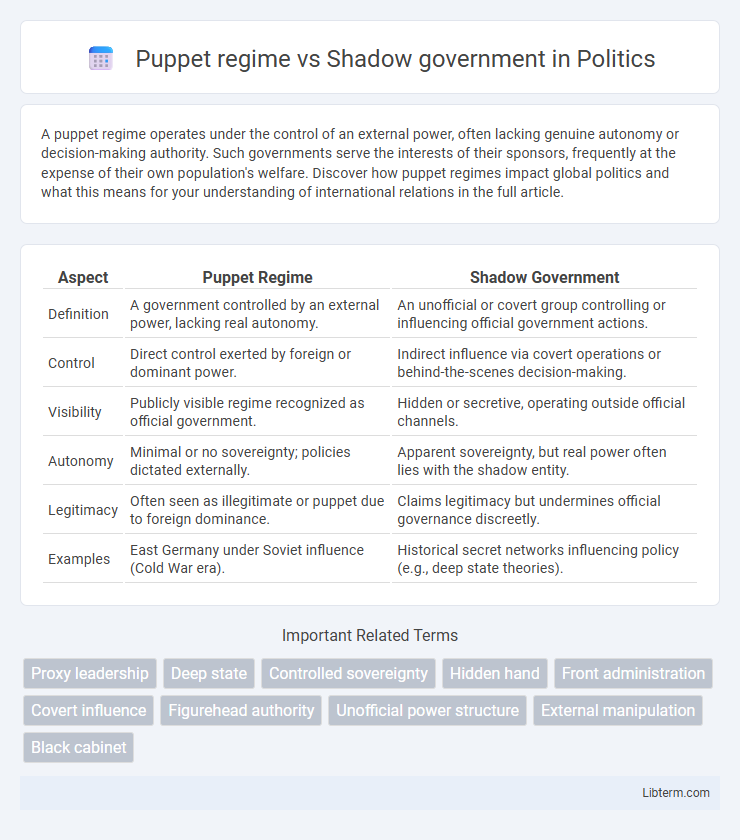A puppet regime operates under the control of an external power, often lacking genuine autonomy or decision-making authority. Such governments serve the interests of their sponsors, frequently at the expense of their own population's welfare. Discover how puppet regimes impact global politics and what this means for your understanding of international relations in the full article.
Table of Comparison
| Aspect | Puppet Regime | Shadow Government |
|---|---|---|
| Definition | A government controlled by an external power, lacking real autonomy. | An unofficial or covert group controlling or influencing official government actions. |
| Control | Direct control exerted by foreign or dominant power. | Indirect influence via covert operations or behind-the-scenes decision-making. |
| Visibility | Publicly visible regime recognized as official government. | Hidden or secretive, operating outside official channels. |
| Autonomy | Minimal or no sovereignty; policies dictated externally. | Apparent sovereignty, but real power often lies with the shadow entity. |
| Legitimacy | Often seen as illegitimate or puppet due to foreign dominance. | Claims legitimacy but undermines official governance discreetly. |
| Examples | East Germany under Soviet influence (Cold War era). | Historical secret networks influencing policy (e.g., deep state theories). |
Defining Puppet Regime and Shadow Government
A puppet regime is a government that is officially in power but is controlled and manipulated by an external authority, often lacking genuine sovereignty or autonomy. In contrast, a shadow government operates covertly behind the scenes, influencing or directing official government actions without holding formal power or public acknowledgment. While puppet regimes are overtly dependent on foreign or external forces, shadow governments function through secret political or bureaucratic networks to shape policy and governance.
Historical Origins of Puppet Regimes
Puppet regimes historically emerged as instruments of foreign powers aiming to control a nation's political landscape while maintaining a facade of local governance. During the Cold War, superpowers like the United States and the Soviet Union installed puppet governments to expand ideological influence without direct occupation. These regimes often lacked genuine autonomy, serving primarily to legitimize external dominance and suppress domestic opposition.
Evolution of Shadow Governments in Modern Politics
Shadow governments evolved as covert power structures manipulating official administrations behind the scenes, often emerging from intelligence agencies or political elites seeking control without public accountability. Unlike puppet regimes, which are overtly installed and dependent on foreign powers, shadow governments operate through secrecy and influence over policy and decision-making processes. Modern politics increasingly witness shadow governments adapting to digital-era tactics, employing cyber operations and covert alliances to sustain dominance while avoiding direct attribution.
Key Characteristics of Puppet Regimes
Puppet regimes are characterized by limited sovereignty, as they operate under the direct control or influence of an external power that dictates their policies and leadership decisions. These regimes often lack genuine political autonomy, serving primarily to legitimize the occupying power's interests while suppressing local dissent and opposition. Key features include a facade of independence, dependency on foreign military or economic support, and the absence of accountability to the indigenous population.
Identifying Traits of Shadow Governments
Shadow governments operate covertly, wielding influence behind the scenes without official recognition, unlike puppet regimes controlled openly by foreign powers. Key traits include non-transparent decision-making, secretive operations, and the ability to manipulate public policy while remaining hidden from direct accountability. These entities often leverage clandestine networks and intelligence apparatuses to maintain power and control over legitimate governmental institutions.
Methods of Control: Overt vs Covert Power
Puppet regimes assert overt power through visible control mechanisms such as direct military presence, official appointments, and public decrees to enforce compliance. Shadow governments employ covert power, utilizing clandestine operations, secret influence, and manipulation behind the scenes to shape policy without formal authority. The contrasting methods of control highlight the explicit domination of puppet regimes against the subtle, concealed tactics favored by shadow governments.
Case Studies: Notable Puppet Regimes in History
Notable puppet regimes in history include the Vichy Government in France during World War II, which collaborated with Nazi Germany under German control, and Manchukuo, a Japanese puppet state in Northeast China from 1932 to 1945. These regimes lacked genuine sovereignty, serving primarily to legitimize foreign occupation while suppressing local resistance. The distinction between puppet regimes and shadow governments lies in overt control versus covert influence, with puppet states visibly aligned with occupying powers, contrasting with shadow governments operating clandestinely to challenge or replace existing authority.
Notable Examples of Shadow Governments
Notable examples of shadow governments include the Ukrainian government-in-exile formed during the Russian invasion, operating independently while the official government faces occupation. Another instance is the Syrian National Coalition, which claims legitimacy against the Assad regime, coordinating opposition efforts abroad. These shadow governments contrast with puppet regimes, which are controlled by foreign powers, as they often seek to represent displaced or marginalized populations without direct external control.
Impact on State Sovereignty and Public Trust
A puppet regime, controlled openly by an external power, severely undermines state sovereignty by imposing foreign interests over national decision-making, leading to widespread public distrust and resistance. In contrast, a shadow government operates covertly, eroding legitimacy through clandestine influence that destabilizes political institutions and fuels conspiracy theories, further diminishing public trust. Both governance forms compromise the autonomy of the state and weaken citizens' confidence in legitimate authority.
Implications for Global Governance and Democracy
Puppet regimes, controlled by foreign powers, undermine national sovereignty and disrupt democratic processes by imposing external interests over local will, leading to weakened governance structures. Shadow governments operate clandestinely, manipulating official institutions and eroding transparency, which fosters political instability and diminishes public trust in democratic systems. Both phenomena compromise global governance by promoting authoritarian influence, hindering cooperative international frameworks, and destabilizing efforts to uphold democratic norms worldwide.
Puppet regime Infographic

 libterm.com
libterm.com